Vote21 - German elections set the scene for key decade of energy transition
Climate and COVID define campaigns as Merkel's era comes to an end
Contents
[Please note: The Clean Energy Wire is hosting a web event for journalists interested in the role of climate and energy topics in the German election: Election follow-up: Germany has voted – what happens next? on 30 September.]
Germany heading for three-party government with climate focus after tight elections
Germany is heading towards a three-party federal government with a significant climate action focus as the Social Democrats scored a thin victory in the federal elections following an unexpected comeback, and the long-ruling conservatives slumped to their worst result ever. The country may not know the successor to chancellor Angela Merkel for weeks if not months as the leaders of both parties vowed to talk to the Green party, which recorded its best result ever, and pro-business Free Democrats to form the country's first three-party government. In first reactions all leading candidates stressed that climate action has to be at the core of any new coalition. Read the article here.
"Climate crisis as a top priority" - Reactions to German federal elections
This is a collection of reactions from German politicians, industry, analysts, NGOs, activists and media to the 2021 election result.
Tracking climate and energy in Germany's election
Clean Energy Wire traces the steps leading up to the election and will highlight developments in climate and energy policy by all major parties in this regularly updated news overview. Find in chronological order a list of all news pieces with the #Elections & Politics tag here and follow CLEW's live coverage on Twitter @cleanenergywire.
The facts
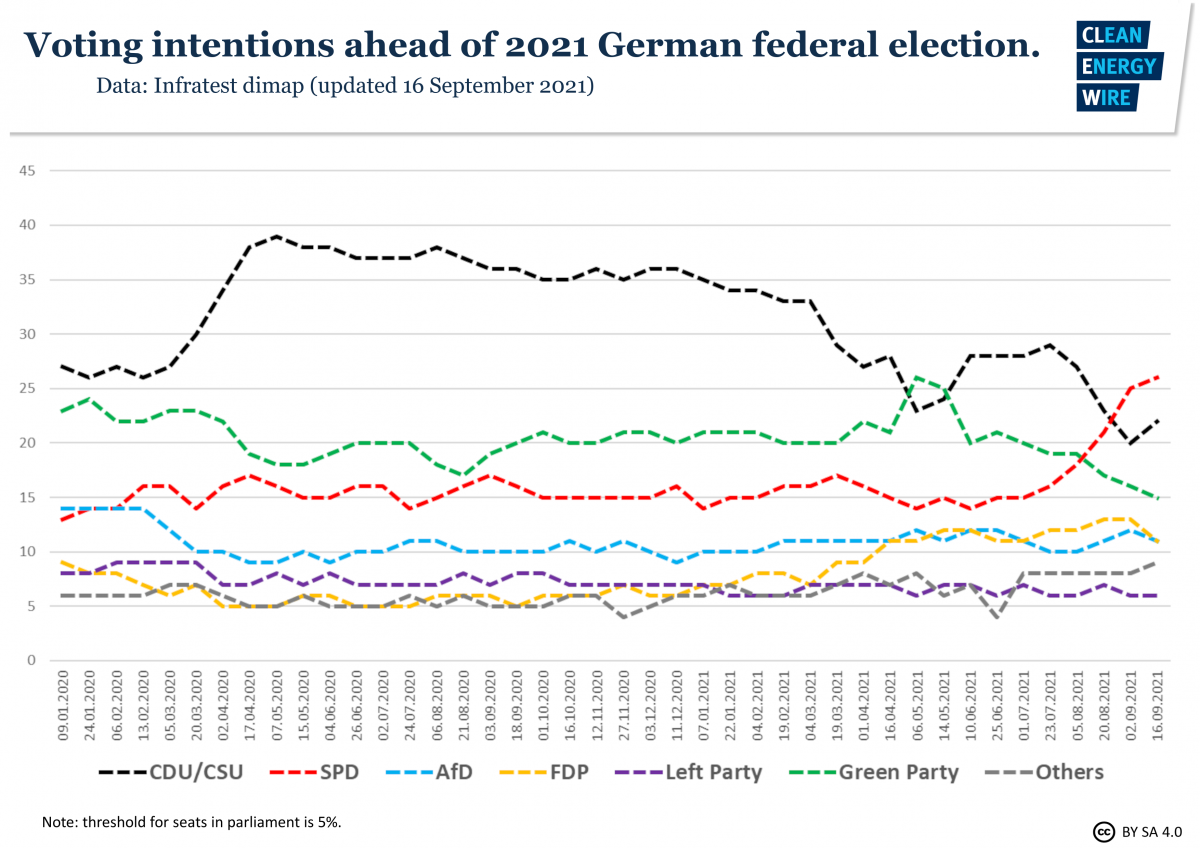
Facts for Germany's packed election year
Clean Energy Wire has compiled contacts, links and other information to help journalists report on Germany's 2021 federal elections. Find the factsheet here.
The long road to a new government coalition in Germany
Officially, the new German government is formed after the new federal parliament decides on a chancellor, but the laborious process to get there can last for months after an election. German voters expect a period of coalition talks and negotiations to follow an election. This year, these could take longer than previously, with more parties involved in the talks after what looks to be a close race. Clean Energy Wire explains the negotiation process and provides a brief overview of the path to the next German government. Find the factsheet here.
Three candidates vie to succeed Angela Merkel as German chancellor in the most unpredictable federal election in decades that will determine the next steps Europe's largest economy takes on the path to climate neutrality. A recent shift in public opinion has unexpectedly made Social Democrat Olaf Scholz the new frontrunner to follow in Merkel's footsteps after the national vote on 26 September, overtaking his rivals Armin Laschet from Merkel's conservative bloc and the Green Party's Annalena Baerbock. Climate and energy policy is a key issue in the election campaign, as climate change remained a top concern for Germans even during the pandemic. All three contenders have committed to make the country climate-neutral by 2045 but offer different routes for getting there. Read the overview here.
Climate and energy are two of the key issues that dominate Germany's 2021 general election. Clean Energy Wire provides a compact overview of major parties' plans to make the country comply with international climate targets and improve the emissions balance across all sectors of the economy. Find the factsheet here.
 of German parties' election programmes 2021. Source: Clean Energy Wire. graph: english overview of German parties' election programmes 2021. Source: Clean Energy Wire](/sites/default/files/styles/paragraph_text_image/public/paragraphs/images/2021-party-programmes-grid.png?itok=IEhcOPJY)
As MPs have the final say on German energy and climate legislation, CLEW is publishing an election interview series with politicians from all major parties sharing their view on the most important energy transition issues in this campaign:
CDU: German conservatives say they have laid groundwork for making country climate neutral by 2045
The conservative CDU has been heading Germany's government since 2005 - and used its time in power to lay the groundwork for making the country the first climate-neutral industrialised nation before the middle of the century, says MP Carsten Müller. The honorary chairman of energy efficiency initiative DENEFF says he is confident that his party will manage to steer the country through big upcoming changes, such as the transformation of the car industry, or putting a higher price on carbon emissions, without relying on prohibitive rules and excessively burdening citizens. Read the interview here.
SPD: "People in rural areas feel the CO2 price already, now we have to help them adapt"
The Social Democrats are hoping to find new partners and new ways to drive forward the expansion of renewable energies in Germany, Johann Saathoff, MP for the SPD and energy expert in the parliamentary group tells CLEW. If in power after the September election, his SPD will work towards a more inclusive energy transition, be it when new wind parks or powerlines are built or when alternative means for heating and transport are needed to avoid rising CO2 costs. Read the interview here.
Green Party: German Greens refuse to reveal red lines in coalition talks
Current polls suggest Germany's elections on 26 September will be followed by complicated coalition talks, but the Green Party refuses to reveal what they consider red lines during the negotiations. The party's climate policy spokesperson, Lisa Badum, who is also a member of parliament, told Clean Energy Wire in this interview that it would be "strategically unwise to reveal negotiation tactics". She added, however, that rapid emission cuts would be key for an agreement, in turn making an earlier coal exit unavoidable. Read the interview here.
Left Party: Left rejects CO2 price for transport and heating as it aims for climate neutrality by 2035
The Left Party would enter negotiations to form Germany’s next government with a demand to abolish the recently introduced carbon price on transport and heating fuels, according to MP Lorenz Gösta Beutin, a climate and energy expert from the party's parliamentary group in the Bundestag. Instead, he says the Left is betting on regulatory policy and “clear rules that no one can buy their way out of” in order to reach climate neutrality as early as 2035 – a target Beutin says is necessary to stay within the 1.5°C limit of the Paris Agreement. Read the interview here.
FDP: "We need climate policy that is as cost-efficient as possible"
Germany's pro-business Free Democratic Party (FDP) plans to argue the case for using emissions trading as the main tool for fighting climate change if they become part of the next federal government. The party wants to extend the EU's emissions trading system to all sectors and countries as quickly as possible. "It is of major importance for the FDP to have climate policy that is as cost-efficient as possible," the party's climate spokesman Lukas Köhler says. Read the interview here.
German Election Primers - which energy and climate topics dominate the campaign?
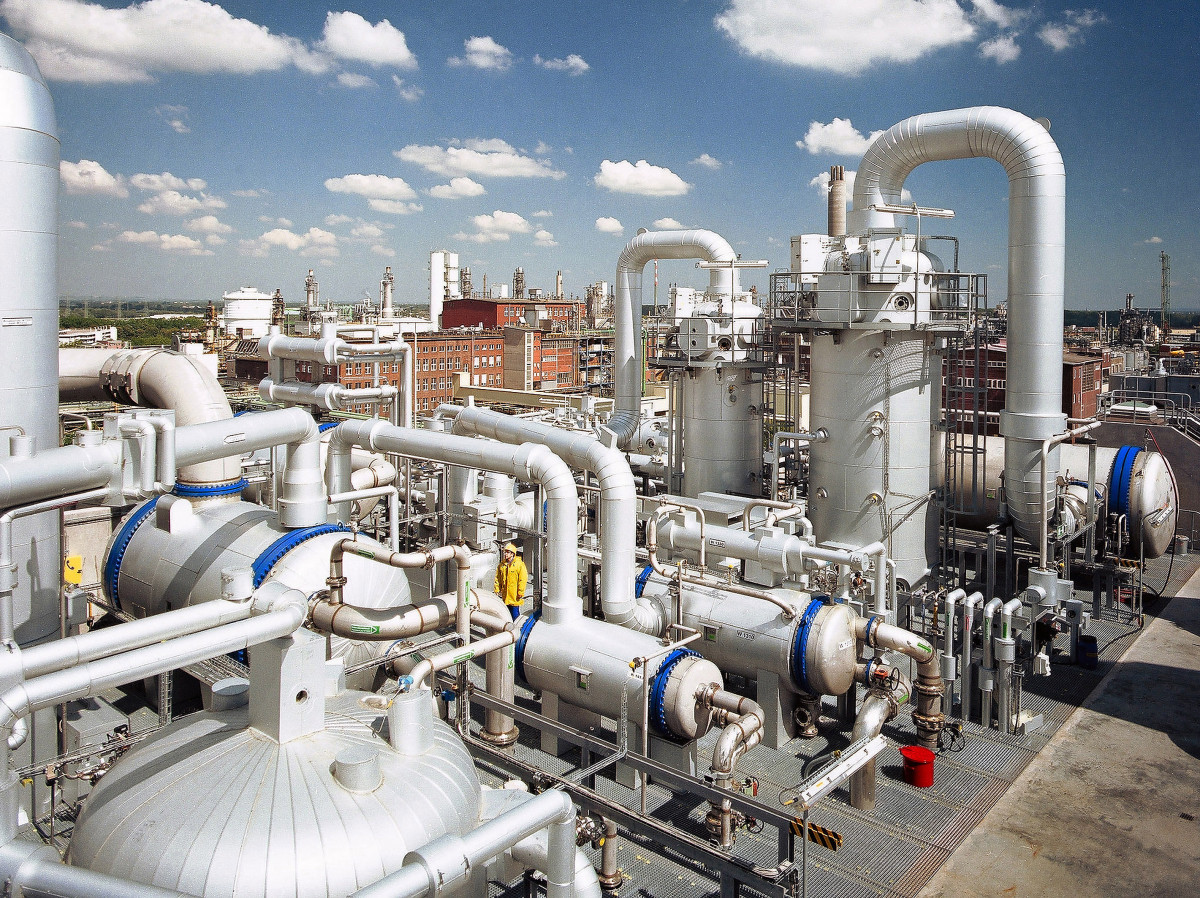
Parties set sights on industry decarbonisation
In its pursuit of climate neutrality by 2045, Germany has set its sights on extending the energy transition to its famed heavy industry. All major parties address the topic in their programmes for the election on 26 September, but deep emission reductions in sectors such as steel, cement and chemicals can't be achieved simply by replacing fossil fuels with renewable power and instead require entirely new production methods. Many major industry players have readied plans for the necessary investments and hope that a new government will put in place the right framework and subsidies needed to make low-emissions products competitive. This overview presents the state of play in industry decarbonisation and its role in election campaigns. Read the article here.
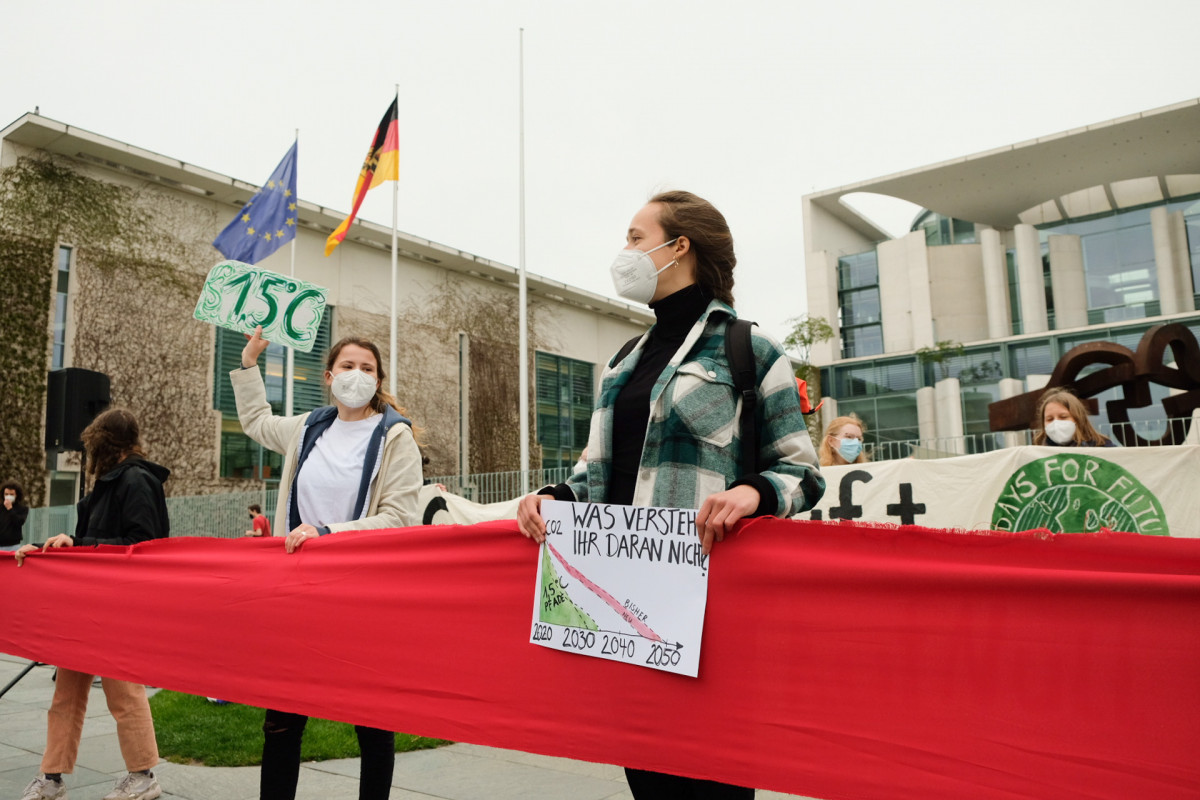
Climate activists push parties to commit to 1.5°C
As Germany’s federal election in September draws closer, climate activists put pressure on all parties to back the 1.5°C global warming limit outlined in the Paris Climate Agreement. After a year of continuous protests in 2019, the pandemic stifled the opportunity for mass protests. But activists are now returning to the streets to demand more ambitious climate policies and a just transition that "leaves no one behind." Some of the young protesters are running for political office, for example with the Greens, while others have established their own political party to push for climate action without compromise. This overview shows how the climate movement aims to influence German policy and what they demand of the next government. Read the article here.
2038 end date for coal under fire as climate forecasts worsen
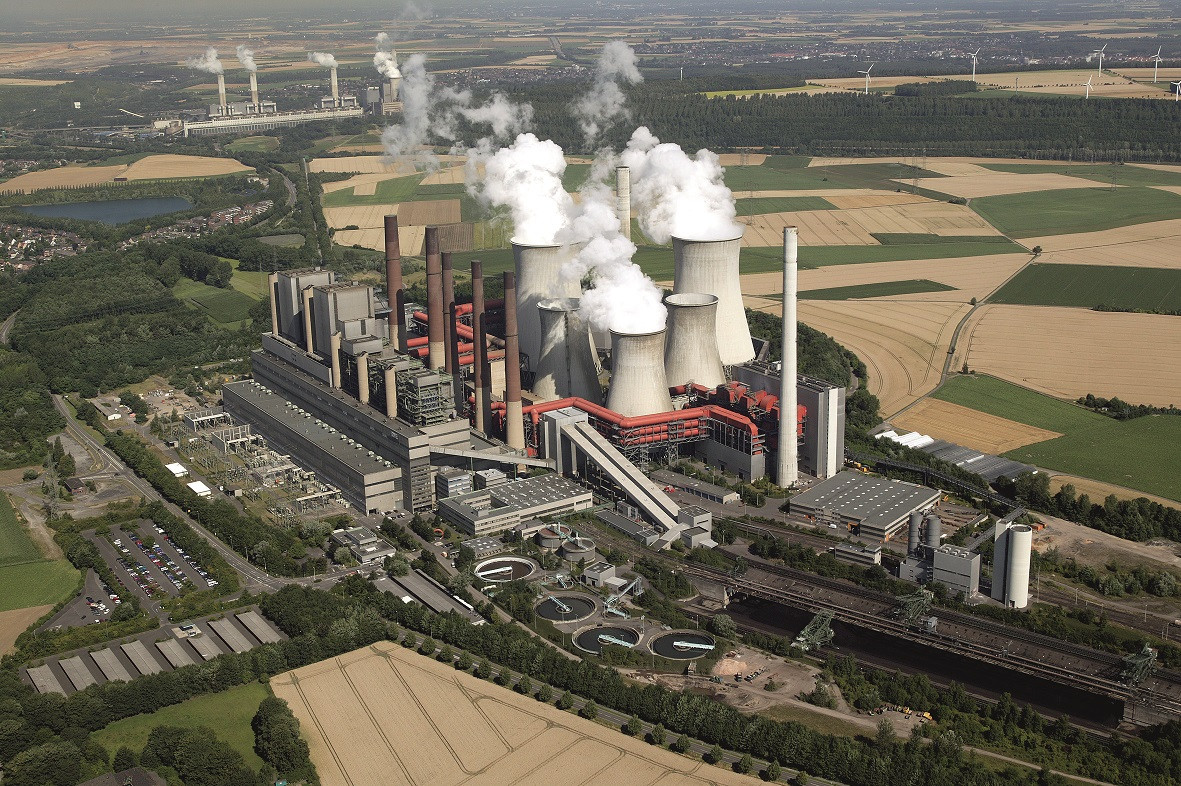
Tighter emission targets and mounting signs of climate change have once again turned Germany's coal exit into a hotly debated election campaign issue. The country agreed last year to phase out coal by 2038 at the latest, but many climate activists and experts say Germany must quit the most carbon-intensive fossil fuel much earlier to achieve the emission cuts it now envisages. Meanwhile, market conditions for coal-fired power plants have worsened, undermining their profitability. This overview presents what the phase-out law says, how far Germany's coal exit has progressed and who is challenging the existing exit plan. Read the article here.
Faster renewables expansion vital for next government's climate policy
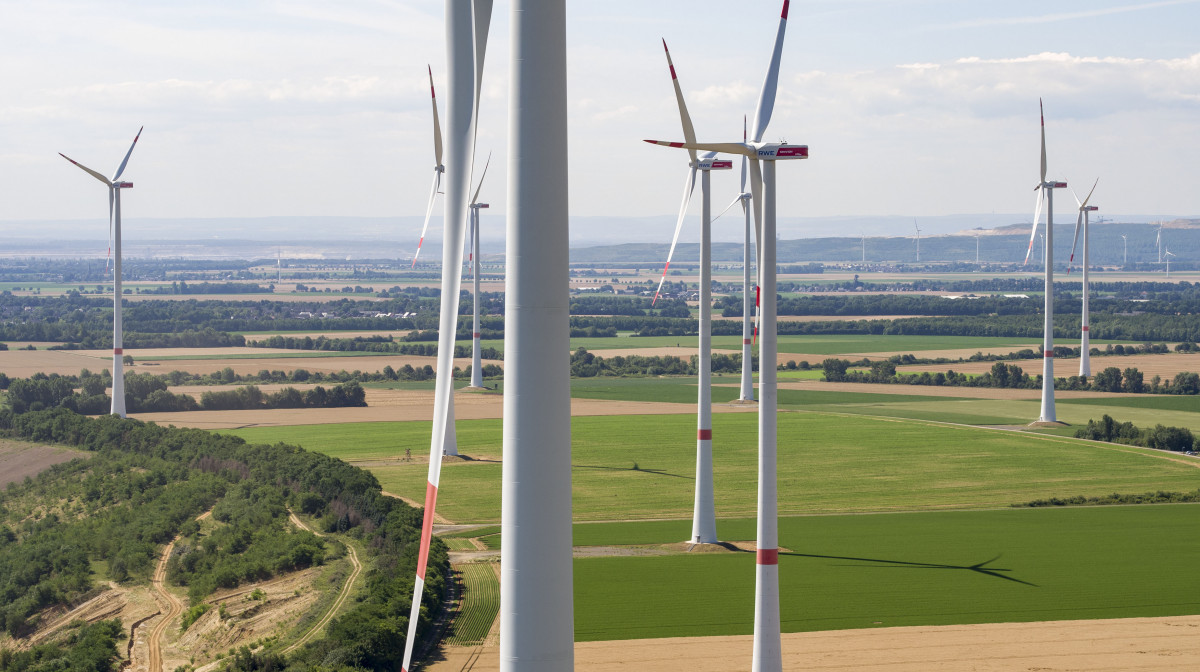
Almost all parties in parliament are calling for climate policies that quickly and lastingly reduce greenhouse gas emissions. The country’s plans to achieve climate neutrality by 2045 depend largely on the rapid expansion of renewable power sources. Wind turbines, solar panels and other renewables are needed to substitute coal and nuclear plants that are gradually dropping out of the power mix, and to satisfy growing demand for electricity used for low-carbon technologies, such as electric cars or green hydrogen production. But even as climate neutrality is a common goal, there is little consensus on how to achieve it in practice. This overview shows the state of play of renewables in Germany, what hinders their construction, how they are financed and what the next government faces. Read the article here.
Parties split on raising national CO2 price
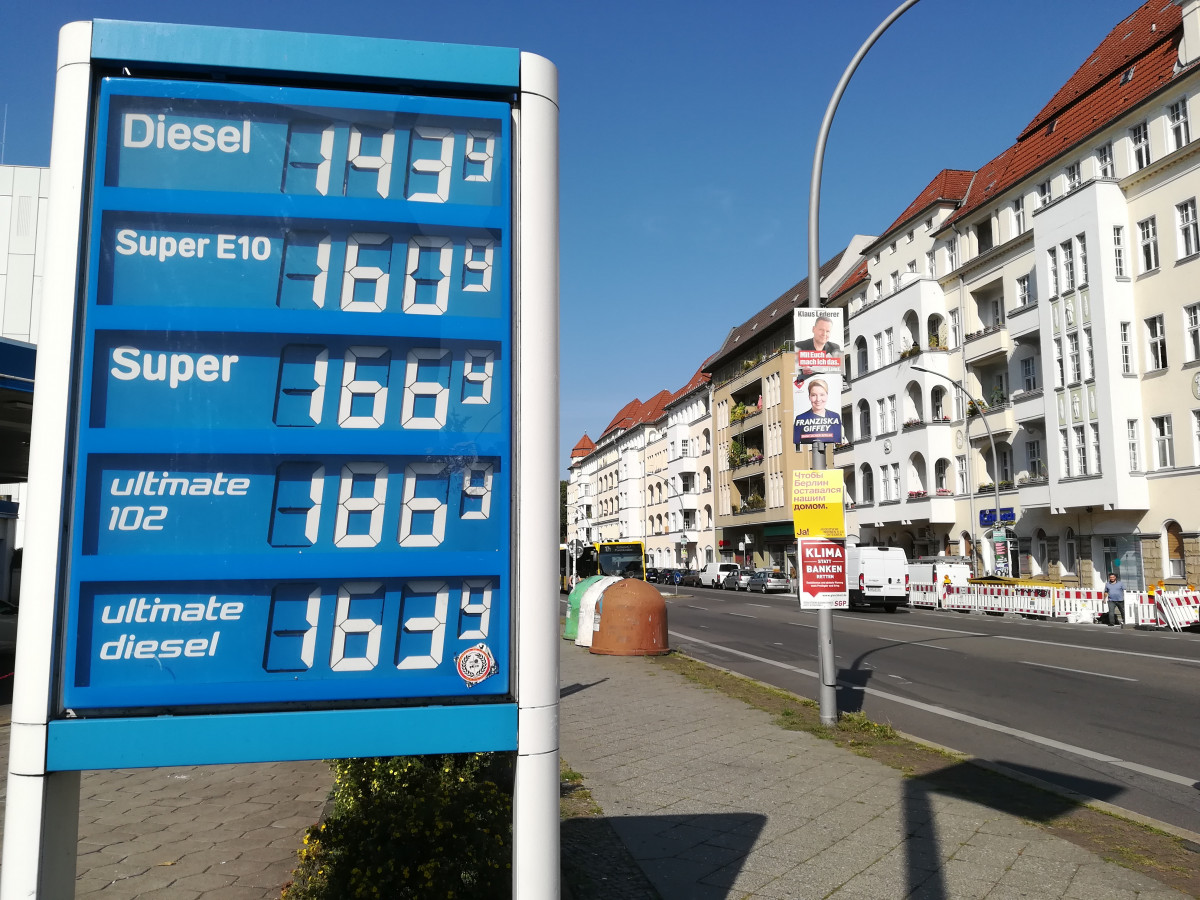
Many economists and climate researchers view raising the national carbon price on transport and heating fuels faster than currently planned as essential to reaching new, higher climate targets in both sectors. The debate about a possible increase has become a key issue in Germany’s election campaign, because it would inevitably lead to higher prices for petrol or heating oil – hurting citizens’ wallets and affecting their day-to-day lives. This overview presents the key points of the debate over raising Germany’s national carbon price. Read the article here.
Fight over combustion engine phase-out heats up

Germany's upcoming general election adds fuel to the debate about whether combustion engines have a future in the birth country of the automobile and whether a general speed limit should be introduced on its famed autobahns. Given the size and status of Germany's car industry, these and many other steps on the way to sustainable mobility are hotly contested within politics, the industry and society. Lobbyists on both sides have stepped up their efforts in the debate with a view to the September vote. This overview presents key points of the debate about the future of mobility in Germany's election campaign. Read the article here.
Candidates handle agriculture transformation with kid gloves
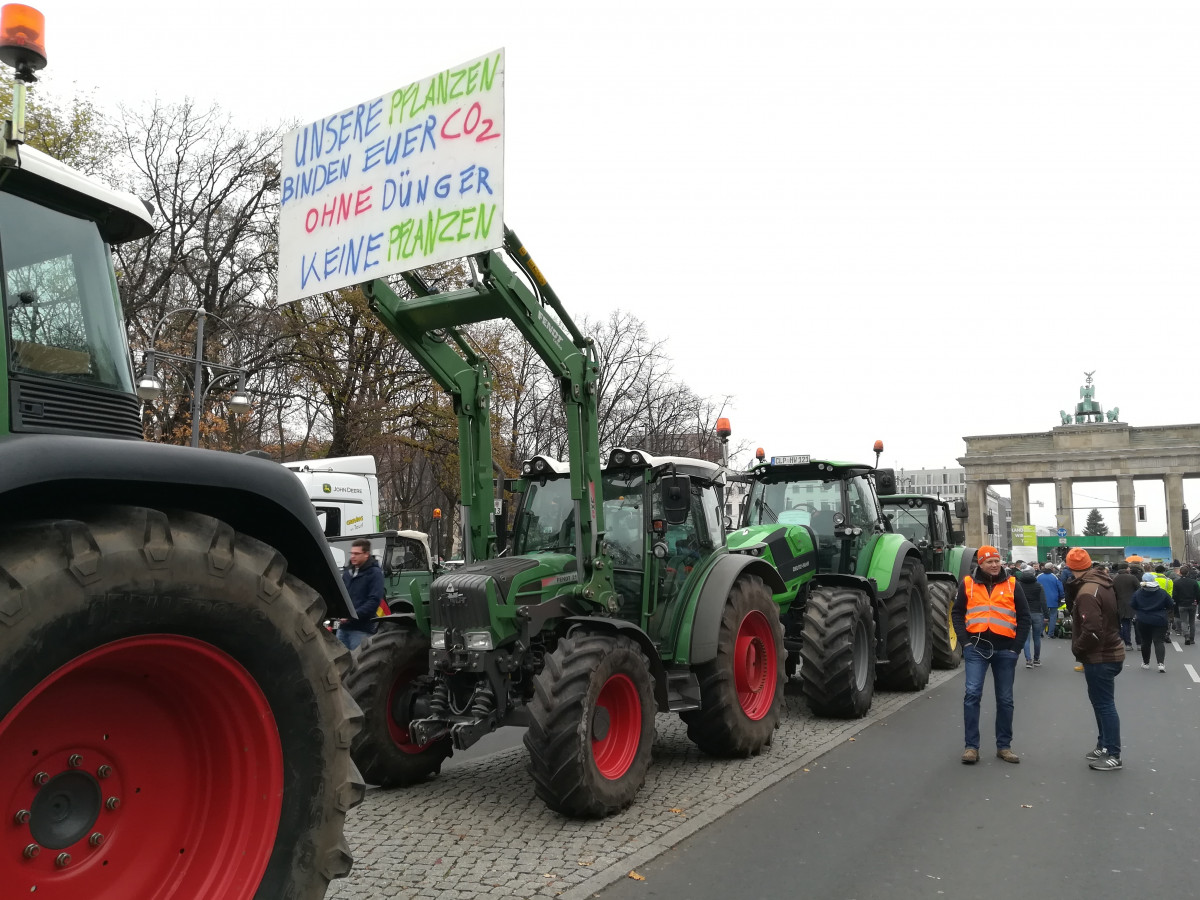
Germany’s upcoming national election is the first in which climate and energy policy have truly taken centre stage. In the agriculture sector, droughts and new policies aimed at bringing out the sector’s potential for eco-system services and climate protection have left many farmers concerned about their future, while environment and climate activists insist that more has to be done if Germany is to reach its new 2045 climate neutrality target. The next German government will have to spell out the details of the agriculture transformation but in the election campaign most politicians tread carefully, remembering huge farmers’ protests over new environment policies and consumer outcries over (less meat-heavy) diet proposals in the past. This overview presents key points of the debate about the future of agriculture in Germany's election campaign. Read the article here.
Climate dominates Germany’s most unpredictable election in decades
Never before in German history has climate policy played a role as big as it does in 2021. Even after one and a half years of a turbulent pandemic, credible climate policies remain the yardstick many voters plan to base their decision on. Deadly floods showcasing the perils of global warming in the middle of the election campaign, ongoing climate protests and increasing calls by industry to decide on a steadfast strategy form the backdrop of a highly volatile election scenario. The country’s political landscape could become deeply shaken after long-term chancellor Angela Merkel leaves the stage, as her conservative party has taken an unprecedented drop in popularity while the Greens greatly expanded their reach – only to then cede the main competitor’s role to the Social Democrats. Whatever the election will bring, the country could be in for months of coalition talks. And the true difficulties for climate policy will only begin there. Read the story here.
Global Fridays for Future strike calls for climate action 2 days before German election
Youth climate movement Fridays for Future called for a rapid transition to climate neutrality at its eighth global climate strike just two days before the German federal election. Protests took place in hundreds of German towns and cities, with participants demanding all parties pursue socially just climate policies in line with the target of limiting global warming to 1.5°C. Swedish activist Greta Thunberg, who started the climate strikes in 2018, joined the demonstration in Berlin, where thousands of protesters assembled in front of the national parliament. Read the article here.
Two states with climate policy sway will also vote on Germany’s federal election day
Regional votes in two German states on 26 September are being overshadowed by the federal election on the same day. But the outcome in German capital Berlin and in the north-eastern state Mecklenburg-Western Pomerania will affect how the next German government’s energy transition policy is implemented – such as ramping up renewables. In both states, the Social Democrats have a good chance of winning – also at the national level. Read the article here.
Merkel successor must spend diplomatic capital for EU climate & energy package – former commissioner
The EU’s ‘Fit for 55’ package of climate and energy legislation will be “incredibly difficult” to get through member states and German chancellor Angela Merkel’s successor must be willing to spend time, energy and diplomatic capital, says Connie Hedegaard, first European commissioner for climate action between 2010 and 2014. Read the interview here.
Merkel leaves work to do with mixed climate legacy
Once touted as the “climate chancellor”, Germany’s outgoing head of government Angela Merkel’s climate leadership over her 16 years in office is now seen by many as middling. International observers commend her steadfast leadership in negotiations with other leaders, while critics speak of a “lost decade for climate action” at home. In the national election on 26 September, voters will decide who will lead the country’s climate efforts in the future and possibly fill Merkel’s shoes as the facilitator of compromise in Germany, among EU member states and in international relations. Read the article here.
Next German govt must put CO2 pricing centre stage of “more European” climate policy – advisor
International partners can be assured that Germany’s next government coalition after the September election will not veer far off course of the country’s current climate and energy policy, says government advisor and director of two renowned research institutes Ottmar Edenhofer. Recently tightened greenhouse gas emissions reduction targets and the guidelines set by the European Green Deal have already defined a framework for the next four years, he told Clean Energy Wire. Read the interview here.
Rising emissions forecast sharpens climate focus in German election
Germany is set to widely miss its climate targets this year, according to a think tank analysis that adds pressure on the chancellor contestants to present plans for rapid emissions cuts. Six weeks before the country's general elections on 26 September, Agora Energiewende forecast that Germany's greenhouse gas emissions will increase by around six percent as the economy rebounds from the effects of the coronavirus pandemic. The renewables industry called the projected rise a "climate policy disaster," while activists urged chancellor candidates to outline how they intend to put climate policy back on track. Read the article here.
Deadly floods sharpen focus on climate change in German election campaign
Catastrophic floods that killed more than 90 people in Germany have been widely linked to climate change, swinging the issue into focus ahead of Germany’s election campaign. Both Conservative chancellor candidate Armin Laschet and Social Democrat rival Olaf Scholz visited regions that were heavily affected by one of the worst natural disasters in the country's post-war history. Like many other politicians, scientists and media reports, parting chancellor Angela Merkel drew a connection to rising temperatures caused by human greenhouse gas emissions.
Chancellor candidates agree Germany must cut red tape to speed up renewables roll-out
The chancellor candidates of the country’s major parties met face to face on 16 June to discuss climate and energy issues at an event organised by energy industry association BDEW. Three months before the vote on 26 September, the debate showed broad agreement on the necessity to speed up the renewables roll-out with more rapid approval procedures, and the need for gas as a bridging technology. But candidates offered different views on whether the gas pipeline Nord Stream 2 should be completed. Read the story here.
Court ruling puts spotlight on climate as German election campaign picks up speed, govt proposes to raise climate targets
A landmark ruling from Germany’s top court catapulted climate to the top of the political debate as government coalition partners shifted into election campaign mode, blamed each other for shortcomings of the country’s Climate Action Law and proposed to raise Germany's climate targets, all within one week.
Read the stories here, here and here.
Conservatives choose Laschet as chancellor candidate, signalling post-Merkel continuity
Germany’s conservatives have chosen Armin Laschet as their leading candidate for the national election in September, signalling continuity with the era of Chancellor Angela Merkel and ending a days-long power struggle with top rival Bavarian state premier Markus Söder. Laschet, who governs Germany's most populous state, the traditional industry and coal mining heartland of North Rhine-Westphalia, is seen as a centrist likely to follow the moderate course of current chancellor Merkel. In the race against his main contender – newly-chosen Green Party candidate Annalena Baerbock – Laschet can point to his government experience. However, he is likely to face criticism for his somewhat ambiguous energy and climate policy record. Read the article here.
Greens name 40-year old Annalena Baerbock as candidate for German chancellor
The German Green Party unveiled Annalena Baerbock as their candidate for chancellor, touted as the party's first ever serious contender to lead the government in Europe's largest economy. In her nomination speech as the only female candidate to succeed Angela Merkel, Baerbock said she wants to make climate action "the yardstick for all sectors" in order to fulfil the Paris Agreement. "Climate action is the task of our time, the task of my generation." The Greens' smooth and professional selection process stood in sharp contrast to the Conservatives' ongoing bitter power struggle over the candidacy to succeed Merkel after the September general elections. Read the article here.
Choice of candidates to kick off German chancellor race (7 April 2021)
Germany’s ruling conservatives and the Greens are about to kick off the 2021 national election race in earnest by naming their respective leading candidates to take over the helm of Europe’s biggest economy in autumn. While the country has firmly set sails for climate neutrality by 2050, the camps’ choices could prove critical for the speed of the energy transition in this decade. Engulfed by a lobbying scandal and accused of mishandling the fight against the coronavirus pandemic, chancellor Angela Merkel’s CDU/CSU alliance has plummeted in the polls and lost what looked like a guaranteed pole position for the chancellery. It must make the difficult choice between the natural candidate – Armin Laschet, leader of the bigger partner CDU – and much more popular Bavarian CSU head Markus Söder. The Greens – for the first time with a modest but realistic chance to lead a federal government – will select one of their co-leaders Robert Habeck or Annalena Baerbock. The latter is the only female contender in the race. The Social Democrats – who have already nominated finance minister Olaf Scholz – are trailing behind the Green Party in current polls, narrowing their chances of grabbing the government’s top position. Read the article here.
Lobbying scandal halts German renewables talks, shakes up election outlook (19 March 2021)
Germany's Social Democrats (SPD) have put key talks about the expansion of renewable energies on hold because of lobbying allegations against yet another parliamentarian of chancellor Angela Merkel's conservative bloc. The lobbying scandal engulfing the conservative CDU/CSU alliance has derailed important talks about Germany's plans for rolling out renewables. The affair also dampens the Conservatives' hopes of an unchallenged victory in September's general elections. Read the article here.
German state votes deal blow to CDU's post-Merkel hopes while Greens get boost (15 March 2021)
"Super election year" 2021 in Germany has been kicked off with a resounding defeat of Chancellor Angela Merkel's conservative CDU in two state elections that saw the party incur historic losses. For the rivalling Green Party and the Social Democrats (SPD), the votes in Baden-Württemberg and Rhineland-Palatinate have brought fresh hope that the conservatives' sway might fade away when popular long-time leader Merkel retires after the national elections in September. The Green Party was able to celebrate record win in wealthy state Baden-Württemberg. It also largely fended off competition from a new climate party launched only months earlier that has vowed to sting the Greens into demanding even more ambitious climate policy. Only losing a few percentage points to the 'Climate List' could hamper the Greens' prospects for forming a centre-left coalition that could bring the country its first Green chancellor. Read the article here.
New CDU leader brings continuity with Merkel era but comes with stained climate reputation (18 January 2021)
Armin Laschet has been elected the new leader of Germany's largest party, the Christian Democrats (CDU), clearing a major hurdle on what could be his way to becoming next German Chancellor. The premier of Germany's largest federal state, the traditional industry and coal mining heartland of North Rhine-Westphalia, is seen as a loyalist to Angela Merkel and stands for continuity with the parting long-term leader's centrist course. However, Laschet's reputation in climate policy is dominated by his pro-industry positioning in the country's coal exit negotiations and his government's heavy-handed handling of protests against a new lignite mine. Read the article here.
Germany faces packed election year as voters weigh climate against pandemic recovery (4 September 2020)
The era of Chancellor Angela Merkel will come to an end when Germans head to the polls next autumn after what looks set to become an unusually dramatic run-up to the federal elections. With no clear front-runner for her succession in sight and the coronavirus pandemic adding huge uncertainties, the elections may result in unprecedented government coalitions that might eventually determine the climate ambitions of Europe's largest economy. The coronavirus pandemic is likely to loom large in the election year and could still grow in weight as the economic fallout makes itself felt. However, it seems unlikely to override citizens' increasing commitment to environmentally friendly policies. Read the article here.
